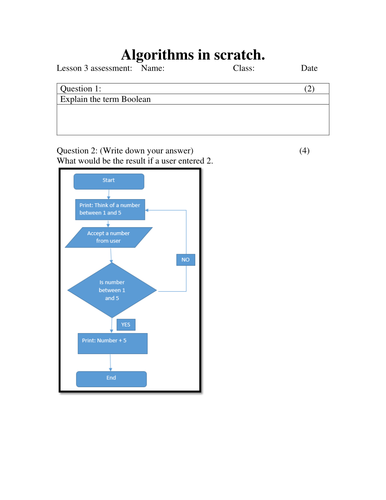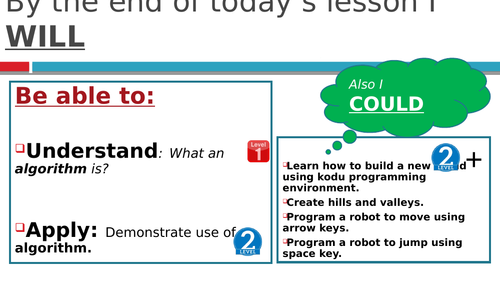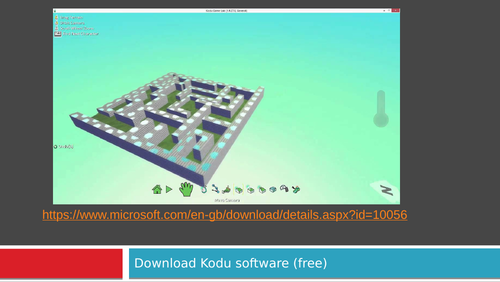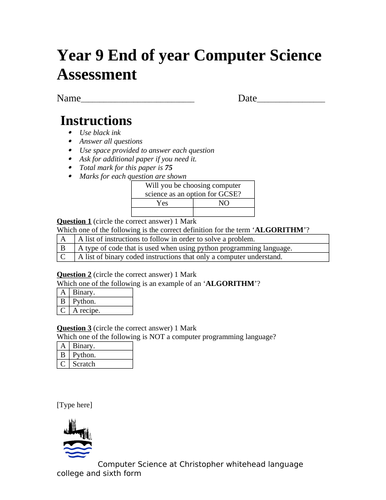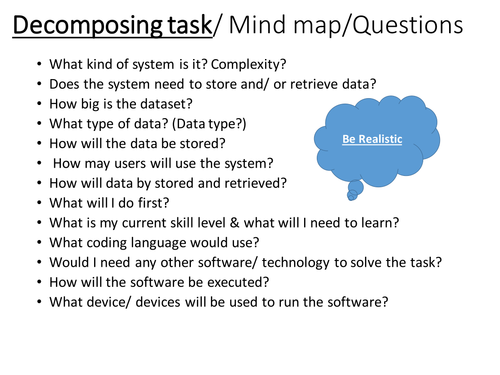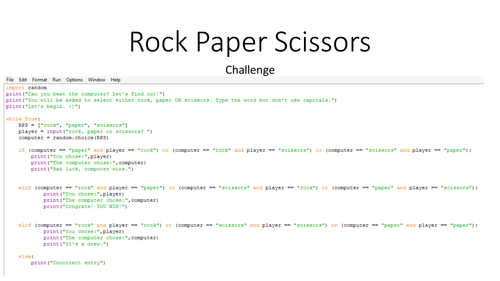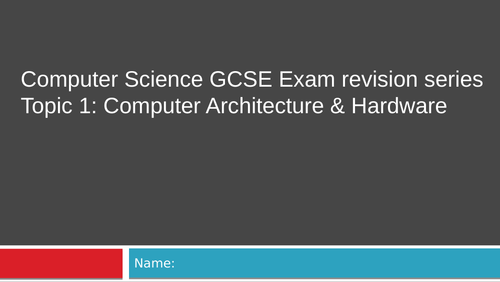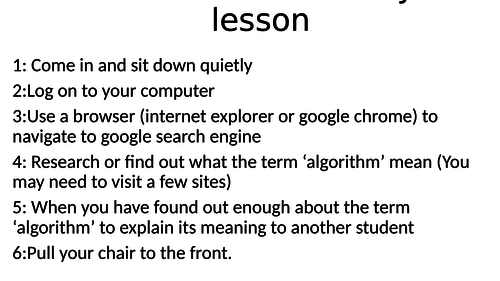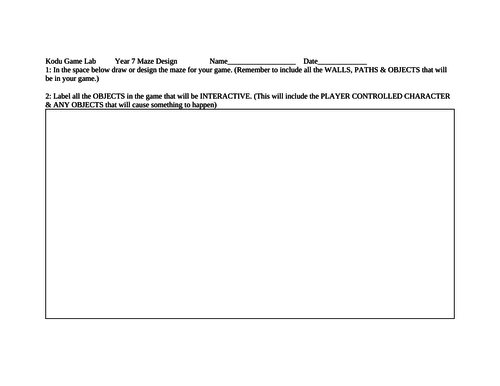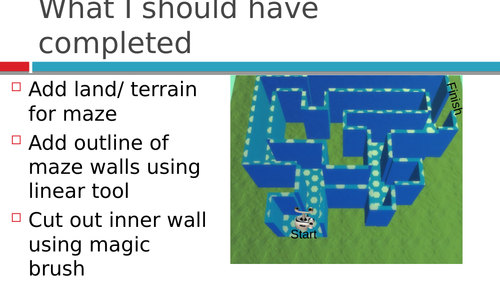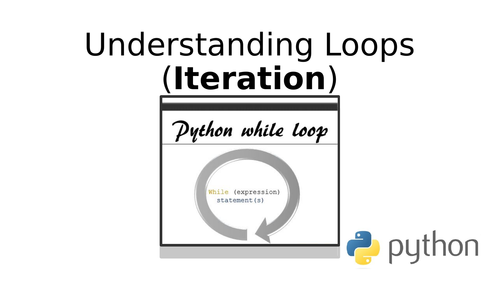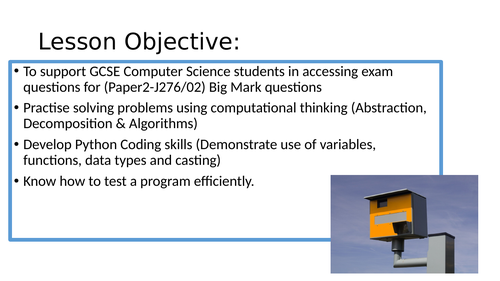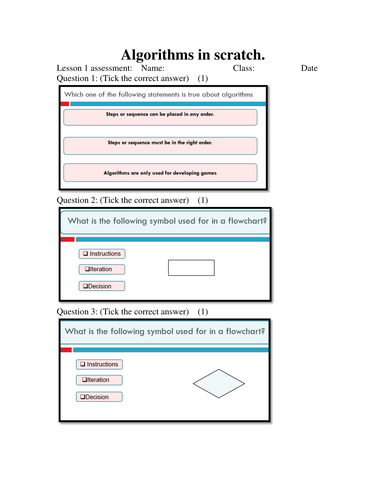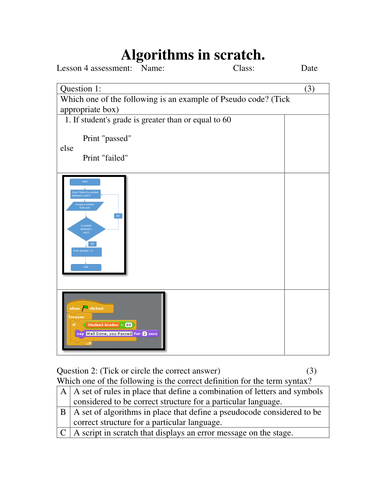
40Uploads
24k+Views
45k+Downloads
All resources

Python Iteration L5 - Introduction to while loops
From Scratch to Python - While Loops (Iteration) Lesson 5
This series of lessons will prepare all students, particularly in KS3 to develop their computational thinking skills, which is required for most KS4 qualification. It is also aimed at students aiming to sit GCSE computer science, and will support, provide a thorough and secure understanding of loops, particularly condition controlled while loop. There is adequate practise at applying skills. Starter plenary and homework activities included. This lesson is aimed at all abilities, although lower ability may require more time to process content or additional lessons to complete all tasks. Lesson objectives are extracted from the new computing curriculum in England for KS2 and KS3. Although this lesson can be taught as stand alone, students who have already used algorithms in scratch series and from scratch to python will benefit from continuity and familiarity of keywords and exercises. Students will need knowledge of how to use input and output function with knowledge of variables in python. Or alternatively purchase introduction to python - from scratch to python series. They will also need the python IDLE environment which is available to download free at https://www.python.org/downloads/release/python-350/. Please feel free to email chris_vidal2000@yahoo.com for feedback or further advice.

The significance of Testing (Computer Science GCSE A453 Project)
Testing is one of the most important processes when working on the computer science GCSE A453 project. Without testing a new system (project) thoroughly students may loose vital marks.
This Power Point demonstrates how complex and difficult it is to test every possible outcome and teaches students to understand even the most rigorous of testing may not catch every error in the program. There are example case studies of situations where new computer systems or software upgrades have caused major problems because they have not been tested properly.
Students/Testers are encouraged actively try to break the system, pushing it to extremes to test its strength and resilience. Students will also learn to write and demonstrate use of test plan.

Algorithms in Scratch Lesson 3
This 6 lesson structure course is aimed at KS3 students to develop understanding about coding techniques using algorithms. Each lesson contributes to the development of a maze game using scratch. Students can sign up for a free account. Notes are supplied with Power Point slides and each lesson is assessed individually. Medium term plan highlight how this scheme of work matches requirements of the new curriculum for computing. This unit will help prepare and support your students at KS3 to develop their knowledge and understanding and prepare for computer science at KS4. Lesson objectives are clearly explained, and non specialist should be able to use power point to deliver lesson comfortably. Lesson objective levels are linked with new curriculum levels. Keywords are reinforced each lesson. Students will enjoy coding and learn fundamental principles as they work their way through lessons. Although their are 6 lessons, depending on ability, you may need additional time. Also a benefit to allow students a few extra lessons to explore and demonstrate coding principles independently.
Algorithms, Coding, Key stage 3, scratch, computational thinking, sequence, selection, iteration, variable, syntax,

Scratch Exercises for computational thinking
Build students ability to make independent progress and think computationally with a range of programming skills using scratch. Students will learn vital keywords required as fundamental building block for computer science GCSE. Each exercise is independent of each other. Challenges range from simple to difficult and students are encouraged to consider and compare alternative solutions. Solutions for each challenge is provided, easy to follow and understand even for a non specialist teacher. This series of exercises is targeted at KS3 students, although KS4 students will also benefit from it as a revision tool for GCSE computer science. It is strongly advised that these exercises are used after students are taught fundamental skills from algorithms in scratch series.

Kodu-Rythm Lesson 2(An Introduction to coding using Kodu)
Kodu is a friendly graphical programming language where students can build their own world and program objects within. This series of lesson uses kodu to introduce computer science terminology such as algorithm and variables to develop computational thinking skills.

Kodu-Rythm Lesson 1(An Introduction to coding using Kodu)
Kodu is a friendly graphical programming language where students can build their own world and program objects within. This series of lesson uses kodu to introduce computer science terminology such as algorithm and variables to develop computational thinking skills.

Year 9 Computer Science Assessment
This year 9 computer science assessment could either be used at the start of the year to assess suitability or at the end to assess learning. Another option is to do both and measure student progress and impact of teaching. Students aspiring to student computer science at GCSE must aim to score between 30 and 75. Answers/ Mark scheme provided.

GCSE Computer Science example Project Walkthrough - Structure - Approach(NEA)
Undertaking a non examined assessment is an overwhelming task for both students and teachers. Providing the right type of support in terms of structure, approach and feedback, whilst adhearing to examining board rules and regulations is key. This PowerPoint provides a techer/ student discussion and walkthrough of a problem, to a possible solution. It also provides a structure for students to present their solution in an easy to mark format. Analysis, design, development and evaluation is covered. There is plenty emphasis on computational thinking and decomposing the problem to a managable size.

Python Decision Making L4 - Sorting Lists
This series of lessons will prepare all students, particularly in KS2 and KS3 to develop their computational thinking skills, which is required for most KS4 qualification. It is also aimed at students aiming to sit GCSE computer science, and will support, provide a thorough and secure understanding of fundamental topics with adequate practise at applying skills. Decision making is an essential skills to master in computer science and students from any level can be guided through this lesson with teacher notes and make good progress. Starter plenary and homework activities included. This lesson is aimed at all abilities, although lower ability may require more time or lessons to complete all tasks. Lesson objectives are extracted from the new computing curriculum in England for KS2 and KS3. Although this lesson can be taught as stand alone, students who have already used algorithms in scratch series will benefit from continuity and familiarity of keywords and exercises. Students will need knowledge of how to use input and output function with knowledge of variables and lists in python. Alternatively purchase introduction to python - from scratch to python series. They will also need the python IDLE environment which is available to download free at https://www.python.org/downloads/release/python-350/. Please feel free to email chris_vidal2000@yahoo.com for feedback or further advice.

Teaching Python Coding: An Exercise for GCSE Computer Science coursework preparation-Answers
This Power Point supports students preparing for GCSE computer science, using python code for notorious game rock paper scissors. Students are expected to examine the code by identifying variables, explaining the coding keywords, structure and approach. In addition, students are given the opportunity to test the code and come up with suggestions for improving the design. Solutions to all questions provided.

GCSE Computer Science Exam Revision: Topic 1
This comprehensive revision for GSCE computer science covers all the knowledge a student requires to achieve a top grade in the exam for computer architecture topic. Knowledge is structured into simple to understand slides, with concepts scaffolded into clear diagrammatic illustrations for students to self study. Non specialist teachers can use this PP to teach students vital knowledge they need to know for the exam. Also included are practice exam questions to familiarize themselves to the style of GCSE exam questions and also give them confidence in applying knowledge learned.

Introduction to algorithms
A gentle and friendly introduction to algorithms with a simple worksheet to enable students to develop computational thinking. Understanding how algorithms work and how they are used by computers is fundamental to achieving success in GCSE computer science. This lesson introduces KS2 and KS3 students to algorithms. This lesson could be used alongside the algorithms in scratch series.

Kodu-Rhythm Lesson 3(An Introduction to coding using Kodu)
Kodu is a friendly graphical programming language where students can build their own world and program objects within. This series of lesson uses kodu to introduce computer science terminology such as algorithm and variables to develop computational thinking skills.

Kodu-Rhythm Lesson 4 (An introduction to coding using kodu)
Kodu is a friendly graphical programming language where students can build their own world and program objects within. This series of lesson uses kodu to introduce computer science terminology such as algorithm and variables to develop computational thinking skills.

Getting your head around while loop - ITERATION for beginners.
Understanding variables and loops are the most significant aspects of coding. It is important for students in early stages to grasp the concept of how loops work if the are to be successful candidates for computer science. This power point presentation is a scaffold building fundamental steps required in understanding and applying loops using python. Students must already know how to use basic input and output functions in python. The language and terminology used is simple enough for a non specialist to use and teach a coder at beginner level. The python idle software is available to download for free at https://www.python.org/downloads/. After students have fully grasp the concept of loops and how they work, they extension task will provide a challenge for them to apply their knowledge, using computational thinking to improve their code.

Computer Science J276/02 Computational thinking, algorithms and programming Lesson
To support GCSE Computer Science students in accessing exam questions for (Paper2-J276/02) Big Mark questions
Practise solving problems using computational thinking (Abstraction, Decomposition & Algorithms)
Develop Python Coding skills (Demonstrate use of variables, functions, data types and casting)
Know how to test a program efficiently.

Computing Keywords Countdown starter
Use this countdown computing keyword quiz to introduce KS3 students to vital keyterms. Can be used as a starter or a whole lesson. A great resource to use as a cover lesson. Students are given some time to come up with computing keyterms from a range of letters. Points are awarded for words and words containing more letters score more points. Students are asked match the definition to the keywords. -
BIT
RAM
ROM
BYTE
BINARY
SYNTAX
BROWSER
SOFTWARE

Algorithms in Scratch Lesson 1
This 6 lesson structure course is aimed at KS3 students to develop understanding about coding techniques using algorithms. Each lesson contributes to the development of a maze game using scratch. Students can sign up for a free account. Notes are supplied with Power Point slides and each lesson is assessed individually. Medium term plan highlight how this scheme of work matches requirements of the new curriculum for computing. This unit will help prepare and support your students at KS3 to develop their knowledge and understanding and prepare for computer science at KS4. Lesson objectives are clearly explained, and non specialist should be able to use power point to deliver lesson comfortably. Lesson objective levels are linked with new curriculum levels. Keywords are reinforced each lesson. Students will enjoy coding and learn fundamental principles as they work their way through lessons. Although their are 6 lessons, depending on ability, you may need additional time. Also a benefit to allow students a few extra lessons to explore and demonstrate coding principles independently.
Algorithms, Coding, Key stage 3, scratch, computational thinking, sequence, selection, iteration, variable, syntax,

Algorithms in Scratch Lesson 4
This 6 lesson structure course is aimed at KS3 students to develop understanding about coding techniques using algorithms. Each lesson contributes to the development of a maze game using scratch. Students can sign up for a free account. Notes are supplied with Power Point slides and each lesson is assessed individually. Medium term plan highlight how this scheme of work matches requirements of the new curriculum for computing. This unit will help prepare and support your students at KS3 to develop their knowledge and understanding and prepare for computer science at KS4. Lesson objectives are clearly explained, and non specialist should be able to use power point to deliver lesson comfortably. Lesson objective levels are linked with new curriculum levels. Keywords are reinforced each lesson. Students will enjoy coding and learn fundamental principles as they work their way through lessons. Although their are 6 lessons, depending on ability, you may need additional time. Also a benefit to allow students a few extra lessons to explore and demonstrate coding principles independently.
Algorithms, Coding, Key stage 3, scratch, computational thinking, sequence, selection, iteration, variable, syntax.



